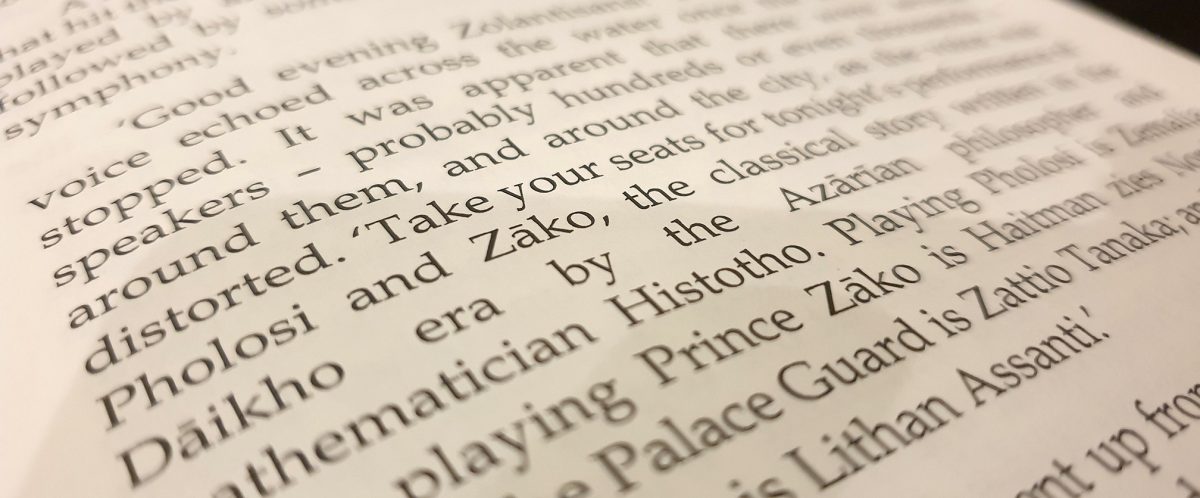It’s taken me a while to get around to writing this review –
I’ve been putting it off, because quite frankly I’m just glad that this series
is over and I don’t want to spend any more time on it.
This final episode ultimately epitomised everything that was
wrong with this series. I think all of the main things that have been bad about
the previous episodes were in this one too. Because of that, there was no one
main thing that was wrong with this episode, and so nothing that I can focus
this review on – I’m just going to have to go through everything in order. So
here we go.
At the start of the episode, Seven and Elnor are talking,
and Seven says that the ex-Borg have no homes. This is odd, because the
convention up until now is that de-assimilated Borg go back to the civilisation
and planet that they were originally from. Sure that might not be an option for
some people, as the Borg might have destroyed their home planet and the entire
civilisation on it, but then there must be other ex-Borg from the same species,
with whom they could start a colony – something which happens all the time in
the Star Trek universe. Or they could even just join the Federation – there
must be loads of Federation worlds that would have them. I get that the point
of this series is that the Federation became closed off, but that was to
Romulans, not just everyone.
Similarly, Seven says that she has no home. Err … Earth?
Narek makes his way into the Borg cube, where his sister
greets him with a knife to the throat. Why? I get that these two are
adversarial, but she knows it’s him doesn’t she? These two characters are weird
– most of their conversations are quite incest-y. I can’t tell if they hate
each other or want to fuck each other.
Shortly after that we hear a bit more of Narek’s backstory,
from Narek himself. He’s rather pleased that he’s the one who found all the robots, and describes himself as
‘The Zhat Vash wash-out.’ … err … Can
you leave the Zhat Vash? Surely they’d kill you – they seem like the sort of
people who would kill you if you left. Also, has he left? The entire series he’s been doing stuff for the Zhat
Vash? This show not only contradicts canon established by previous shows, but
also things from earlier episodes!
We get a bit of chat between Picard and Soji at this point
in the episode. They try to talk philosophy, but the writers aren’t capable of
it, so a lot of what they say is just gibberish, but at one point Picard says
‘To say you have no choice is a failure of imagination.’ – no, this show is a
failure of imagination.
Speaking of imagination, we get a weird scene between Rios
and Raffi where they try to fix their ship. All of the dialogue in this scene
is weird. Santiago Cabrera once again sounds like he’s reading his lines for
the first time, Raffi is just insufferably patronising as she tries to get Rios
to use the imagination tool thing to fix the ship. In this situation, Raffi
obviously would have no more of an idea of how to use this tool than Rios
would, but somehow she still tells him what to do with it.
This whole scene is completely unnecessary. What does it add
to the episode or the series? Nothing. The imagination tool is just a deus ex
machina tool. It can apparently do anything at any time with no constraints on
materials or power. You don’t even have to learn how to use it. How does it
work? We don’t know. Did the robots know? How did they make it? Did they make it? Where did they get it
from? Seems like it would be good to have a lot of these things about. Are any
of these questions going to be answered? No? Okay then.
Also, the imagination tool sends out these Borg-like tubes
to fix things – is that a deliberate reference? If so, to what? How did these
robots get a Borg device like that?
Throughout this episode we get a lot of very unsubtle
foreshadowing that Picard is going to die and get put into this artificial body
that they’ve been building. But … why are they even making that body in the
first place? Apparently Soong and the other robots have been making this body,
but … why? Who was it for? Was it for Soong? He was the only human there when
they started building it, so it must be – does that mean he has to give up a
new body so that Picard can have it?
Narek goes to the ship where Raffi and Rios are. He tries to
get their attention, and when they ask what he wants, he says he’s ‘Trying to
save the universe.’. No, just no. Fuck off with that. This is a problem that’s
endemic to science fiction nowadays – people aren’t just trying to save a
person, or a group of people, or a civilisation, or a planet, or a star system,
or a galaxy – no, they’re trying to save the whole fucking universe. Stop.
Putting. This. Line. In. Stuff. The story isn’t made more grand and epic by
adding this line – you don’t raise the stakes, because no-one can really
imagine this. This doesn’t increase the tension, it just makes the characters
needlessly melodramatic. You know what actually
raises the tension? Putting characters who we actually give a shit about in
danger. Make us give a shit about the characters, and then put them in danger.
Just having a character exposit the end of the universe does nothing.
It’s also completely inconsistent with what we’ve found out
so far in this series. If this super-advanced AI does arrive, then they
threaten, at most, all of our galaxy – there has been no mention of them going
to other galaxies at all. So no, Narek, you are not saving the fucking
universe.
I also noted down at this point in the episode that it’s
very hard to believe that both Narek and Elnor are Romulans. This isn’t
necessarily a bad thing, as it can just show the variety that there is to
Romulan culture.
Narek’s telling of Ganmadan is fun, but the fact that the
imagery here isn’t better shows that these aren’t very good writers. Also, this
series would have had more tension as a whole if we’d heard this story far
earlier in the series.
Narek says ‘And the fascinating thing about history is …
it always repeats itself.’ No, Narek. No it doesn’t – it sometimes repeats itself. This is the kind of bullshit profound I
expect on Twitter, not in Star Trek.
Jurati’s plan to help Picard escape seems to consist of just
unlocking the door. They walk the six miles back to the ship pretty quickly.
By this point in the episode, I think most of the main
characters know that genocide is imminent, but considering this they are not
panicking nearly enough. Apparently they are all going to die in a few minutes,
along with the people on a lot of other planets (it would seem), but no-one’s
panicking – why is no-one panicking? This is partly why this episode has no
tension, despite it being a ‘save the universe’ plot. The characters are about
the same level of bothered by this as not being able to get a clue on a
crossword.
We have some more bullshit profundity from Picard. He says ‘To
be alive is a responsibility as well as a right.’ … Jesus fucking Christ.
That might sound like the sort of thing that would go on a cheap inspirational
poster that someone shares on Instagram, but this is actually quite a dark
statement. The implication of this statement is that unless you, as a life
form, do not carry out your “responsibilities”, then you don’t get to be alive.
(This also shows why the word “responsibility” is vague, meaningless, and only
really used as a way to get other people to do things regardless of how right
or wrong that thing is, but that’s a rant for another blog post.)
Jurati says ‘Make it so.’ to Picard. How the hell does she know
that he says that? This line is one of many that just serve as a shallow
attempt at fan service by going ‘LOOK! SHE SAID THE THING! SHE SAID THE THING
THAT HE NORMALLY SAYS! REMEMBER THAT? HE NORMALLY SAYS THAT! REMEMBER THAT!
REMEMBER THAT BETTER SHOW THAT YOU COULD BE WATCHING!’ … You know what’s actually fan service? MaKiNg A gOoD
fUcKiNg ShOw!
Down on the planet, Soong and the others are trying to stop all of the androids from doing whatever it is they’re doing. He goes up to Sutra and uses some device on her that knocks her out. He only uses this device ONCE. They then try and fight the other robots off by hand.
Back on the ship, Jurati says to Picard ‘Are you not
answering to build suspense?’ – I suppose this is an attempt at a funny
meta-line, but it doesn’t work. In order to break the fourth wall (or in this
case, dent it), you first have to establish that there is a fourth wall by making your show immersive, which this show is
not. Too often in this show the thoughts of the characters blur with the
thoughts of the writers, which makes a meta-line like this just look like bad
writing.
On the Borg cube, Seven has a gun pointing at Rizzo, and for
some reason she doesn’t kill her straight away. There is no reason for this.
Rizzo then somehow just pushes Seven’s gun aside, and they fight.
Throughout this entire episode, Commodore Sunglasses is the
only Romulan we see on the Romulan ships – I guess they just didn’t have the
money for more.
Picard and Jurati just fly around in front of the Romulans
for a bit, not really doing anything.
Jurati also knows about the Picard manoeuvre. How? I get
that it’s famous, but is it so famous that people outside of Starfleet know it? The only military manoeuvre that I
know is the pincer manoeuvre, and that’s been around for millennia. This is
just more desperate fan service.
Picard gives Soji a call on Zoom. Soji is not surprised to
learn that Picard has left the village.
Up in space, Commodore Sunglasses says ‘Ready planetary
sterilisation pattern number five.’ … apparently planetary sterilisation
patterns one to four are not suitable in this case.
Back on the FaceTime call, why does Soji give a shit about
Picard dying? When she first met him, she didn’t trust him. Have we ever
actually been given a reason why she changed her mind? When did she change her mind? It all just happens because the plot
requires it.
They activate the beacon, and it turns out it’s not just a
beacon that sends a message, it opens the portal from Avengers Assemble. Jesus
fucking Christ – check your fucking script! Make. Sure. You. Know. Whether. It’s.
A. Portal. Or. A. Beacon. They. Are. Not. The. Same. Thing.
Also, the portal is now red when last time it was green.
The Starfleet ships arrive, and they look like they’ve just been
copy-and-pasted in Blender.
We get about a minute of back-and-forth between Riker and
Commodore Sunglasses, and for a few brief moments, the show actually feels like
Star Trek. Jonathan Frakes is still great. If we had a whole series with him as
a captain of a star ship, it could be amazing (though, without any of this
Discovery / Picard style writing – I don’t want another classic character to be
ruined).
Picard’s brain problem spontaneously flares up again, and
honestly it has better dramatic timing than most of the actors.
Very slowly, the super-beings are making their way through
the portal, and apparently they’re just tentacles – not what I was expecting.
They manage to close the portal again, and the super-beings just
decide to go back into it. Apparently even though they’ve been summoned,
ostensibly to rescue the androids down on the planet, they decide that since
the portal has closed they must not need rescuing.
Picard dies, and the rest of the characters just mope around
for a bit. Seven of Nine says that she intended to never again ‘kill somebody
just because it’s what they deserve’. What a weird thing to aim for.
Okay, this next one’s harsh – maybe too harsh, even for me – but Evan Evagora is not an experienced enough actor to pull off that short scene with him and Raffi. Now, I like Evan Evagora – he’s got some great pictures on Instagram – but he doesn’t have a lot of acting credits – only two before Star Trek Picard. Now this alone isn’t a bad thing – in fact I quite like that the show was willing to give out some parts to less-experienced actors – it helps them to get going in the acting world. This short scene is very cringe-worthy, and I actually blame the directors for this, because if you as a director get an actor to do something, and it’s obvious that they can’t really perform that way yet, do the scene differently.
Anyway, we then learn that Data has actually been alive all this
time, inside a simulation, for about twenty years. Why did they leave him
there? They’ve been building all of these other android bodies, why not make
one for Data?
Also, considering how good Brent Spiner is at playing Data,
they should have had a lot more of him in this series.
Data says he wants to die again, and he says ‘Mortality
gives meaning to human life.’ No, no it doesn’t. This line kind of highlights
what’s wrong with this show – Picard is supposed to be a philosophical
character, and Star Trek is supposed to be a philosophical show, but you can’t
have that unless the people writing it are very intelligent.
Anyway, they transfer Picard’s memories into a new body – I’m
not sure what kind of body this is – the show doesn’t seem to understand that a
biological android is just a fucking human, but it seems to want to think that
somehow they’re still robots – I don’t know – it doesn’t make sense. But
something that other critics have said is that this new Picard isn’t Picard – the real Picard died when
his body died. And this is an important point: is a copy a continuation? If
this were classic Star Trek, this idea would have been explored, but since it’s
not classic Star Trek, it isn’t.
The characters are fine with it anyway – they all seem to
consider this new body with Picard’s memories to be Picard. I did wonder though – what did they do with the old
body? Did they just dump it in the trash? We don’t see the other body at any
point – itself an odd choice for the show to make. Perhaps they just wanted to
ignore the philosophical implications of all of this.
In the end, Picard has no brain problem, and Data is still
dead, so basically nothing has changed since the start of the series. (Because
this series chose to make Picard’s
brain problem into a thing – they could have just ignored it any no-one would
have noticed.)
For about half a second just before the final shot of the
series, there’s a brief lesbian moment between Seven and Raffi. This really
pissed me off. It’s so fucking weak. You don’t get representation points for
lesbians holding hands – it’s not 19-fucking-95 – it’s 2020. Two decades ago
you got points for that, but not now. If you want credit for having lesbians in
your show, put them front and centre – make the main two characters lesbians,
THEN you get credit for it. Either put them front and centre or don’t bother at
all. Ambiguous sentences and people in the background holding hands is just
fucking weak.
And then at the end, the ‘gang’ is about to go off on some
other adventure. It’s not obvious why they decide to do this. But more
importantly, what’s actually going to happen to all of those androids down on
the planet? They can’t just be left there – the Romulans would just come back.
In the end, we have no idea what happens to the androids, which was the entire
point of this story.
It’s just astonishing how much of this episode made no sense
– not just in terms of the wider context of the Star Trek canon, but in terms
of things this show said earlier in the
series. There is no consistency; there is no coherence.
I was optimistic about this series – I was optimistic that
it wouldn’t have the same problems that Discovery had. But while it’s not quite as bad as Discovery, it’s obvious
from this series that the showrunners have a critical error in their
understanding of what Star Trek is supposed to be, and a complete inability to
do world-building, separate their thoughts from the thoughts of the characters
they are writing, understand character motivations, write natural dialogue,
build suspense, or have any philosophical ideas that are distinguishable from
what Inspirobot chucks out.
The acting in this show is sometimes good, sometimes
repulsive. The CGI is mostly alright, with the occasional copy-and-paste. The
music is forgettable, but inoffensive. But the writing is an absolute
clusterfuck. This show is a complete failure of writing, and the only value it
has is as an example of what not to do.
I gave Star Trek Discovery a second chance, and watched the
second season. Star Trek Picard is getting no second chance – that’s it, this
show is dead. In fact, after three awful series’ of television, I’m tuning out
of modern Trek. There is just no point watching it, and until there is a
complete change of writing philosophy I’m not going to watch any more modern
Trek. Other shows deserve more of a chance; modern Trek goes to the back of the
line.



